Santa Barbara's mom-and-pop denim shop
A Q+A with Tendrel owners Parker and Molly on their journey, inspiration, and dreams for their menswear venture
Parker Simon, originally from the Chicago suburbs, and Molly Davis, from the Pasadena area, met in college at 18 at the University of San Francisco dorms. Ten years later, in COVID, they moved down to Santa Ynez/Santa Barbara to be closer to family. Life slowed down a bit, but like many others in this time, Parker and Molly were inspired to create something new.
Enter Tendrel — their men’s clothing shop that specializes in Japanese denim and other slow-and-well-made pieces. I caught up with them recently to hear how it all came to be. In our exchange below, learn the inspiration behind the name “tendrel,” see what they’ve got in the shop, and delve into the philosophies that guide the whole operation. Enjoy!
Tell me about the name “Tendrel.”
Parker: I was in a band in college called Hibbity Dibbity, and we’d do these tours across the country. This thing happens when you’re traveling. Sometimes you notice these weird synchronicities. For example, I was in a little town in Colorado on tour once, and I took a wrong turn down a dead-end alley and a friend from high school was just standing there, randomly. And I was like, “Oh, hey! You’re in town to come see our show?” and they were like, “No, I didn’t even know you were here.” Weird stuff like that. So we started noticing these things happen as we traveled more and met more people, and we started calling them “swirly whirls.”
Molly and I are big into Buddhism and meditation. One of my meditation teachers is a musician from the ‘70s and I was telling him about these travel synchronicities, and he said that he calls those “tendrels” — a Tibetan word that means “auspicious coincidence or synchronicity.” So, it stuck.
Later, I started a small thing called Tendrel Records and started helping friends put out music. I thought I’d see if that could turn into starting a music venue here in Santa Barbara, because that’s what I did before in San Francisco — my expertise is running production for big concerts. But when you start looking at the numbers to do a venue, it’s huge! Really expensive.
I was trying to figure it out and realized I was sick of working in production and music and events anyway. I also worked at a law firm here for a little over a year and that wasn’t for me. I realized I don’t want to have a boss. I wanted to start our own thing.
How did you switch gears to opening a store?
Parker: I listened to an interview with the guy who runs global sales at [Japanese denim and pants brand] Iron Heart. At the time, I was already getting into nicer clothes that last longer, and I heard this interview and it resonated so much. It was exactly what I had been looking for — stuff that’s made better, lasts longer, looks better, has a cool story to it, and is small-batch made. So, after that, I went right over to Self Edge in San Francisco (where we were living at the time) and got my first pair of Iron Heart jeans. Now that pair is always styled on one of the mannequins in the store. So, that really kicked it off for me.
Molly: Before that, though, Parker was blowing through Everlane jeans so quickly, since he’s a skater.
Parker: Yeah, I thought Everlane was nicer or something. I bought three pairs of their jeans and they all were supposedly the same size and cut, just different washes. But they all fit me completely different. And they all fell apart on me in less than a year. So, I was like, “Okay…I just spent $300 on three pairs of jeans. What if I spent that on one pair of better jeans?” Would I get 3x the jeans?
So, in 2020, I got the Iron Heart denim and wore them every day for years and years, and they held up! You can see and feel the evidence of wear on them, but they never fell apart. We treat this denim like a leather boot — you wear it in, it’s gonna learn your body, and it’s gonna look better and feel better over time.
Then I slowly started researching brands in this world, and questioning the clothing practices I was used to. And at some point we started throwing around what it’d be like to have a little shop like this. I’m a very go-with-the-flow type of guy. I always say, “First thought, best thought” in my head, and I just grip it and rip it. Molly, though, is super organized and thinks things out more. She provides the necessary filter for my ideas.
So, we took the original plan of opening a music venue and tailored it instead to open our shop. We opened our first space in March 2023, across the street from Lama Dog in the Funk Zone. We moved to our current space at 223 Anacapa St. in May/June of 2024, right before our son Levon was born.
Opening a store is a big, exciting undertaking! What was that transition like?
Molly: At the beginning, Parker was like, “I’m gonna open a store!” and people thought he was crazy. I mean, when we first met, he wore the same USF sweatshirt every day.
Parker: Yeah, I barely had any clothes at that point. I had no money and it was tough imagining spending the money I did have on clothes. But there are three times I can think of where Molly blew my mind in that respect:
We went into an American Apparel and I saw a raglan baseball tee for $30. I wasn’t so sure about the price, but Molly encouraged me to get it, and I wore it until it disintegrated.
Another time, we went to Marine Layer and there was a $45 tee I liked and, again, I was kind of appalled at the price. But Molly told me to get it and I still wear it all the time, with holes all over it and everything.
The third time, we were at the Rose Bowl Flea, and I saw this cool vintage rayon vacation shirt with a Chinese print on it, kind of like a Hawaiian shirt. I loved it. It was $75 and Molly bought it for me and that was by far the nicest thing I ever had in terms of clothes. I even memorialized the shirt on my arm with a tattoo of the print.
Molly: It’s been an evolution. But Parker has always had things and worn them to death. So it makes sense he’s fallen into this world because the clothing is meant to be worn in, for a long time. He wears these pieces every single day. It’s like his uniform.
Parker: We came to a lot of these conclusions and philosophies together. We’ve also always been conscious about food and health and wellness. And we’ve always looked at different areas of our lives and asked: “Where is this coming from, where is my money going, and who am I supporting?” It’s hard to control everything, but you can choose to vote with your dollar and choose who you give it to, whether we’re talking about food, clothes, or something else.
Tell me about the philosophies that guide Tendrel.
Parker: I make sure everything we buy for the store has some common thread and is telling the same story. I have a poster board of everything we’re buying so I can make sure there’s continuity.
Standard & Strange in Santa Fe, to me, has the best tagline of “Own fewer, better things.” That ethos guides Tendrel, too, and it makes sense to me especially since were into Buddhism and meditation. With more conscious living, you slow down and breath and try to be more aware of what you’re doing. When you’re more aware, you make more conscious choices, not just with what you’re buying, but also thinking about how your clothes fit or feel. So, the narrative we’re telling through Tendrel is ever-changing, but simply put it’s: “Look good, feel good.”
I notice a lot of men have trouble fitting clothes to themselves, so I try to bring them in and give them the most mellow shopping experience ever, and help them find something that looks good and feels good for them. I like to think we’re providing an easy approach to nice stuff. I can see how these price tags can be intimidating, but I like inviting people into the story of the quality and craftsmanship. That makes it all make more sense.
I’ve traveled all over to do store research, and most of my favorite stores have some level of narrative to them. Some of my favorite stores and brands are Third Man Records by Jack White, Mister Freedom in LA, the bodē store in NYC (they even have coffee with cardamom and a tailor next to it — it all felt so thoughtful!), Standard & Strange in Santa Fe, and The Love of Ganesha in San Francisco.
I’m generally influenced by things outside of fashion, too. I love Metro Entertainment comic bookstore and Lighthouse Skate Shop here in Santa Barbara — those places really speak to me.
Another big thing we lean into here is utilitarianism. I come from the music world and lots of people in that world are huge gear heads. But I’m not. As a musician, I have one good bass, one good amp, and I use them for years. So, the vision for the buying at Tendrel is: basic styles done to the 10th degree — just super, super well done. I like to stand out with details and fabrics. The ultra heavy flannels we sell might not visually blow you away at first, but as soon as you put it on you feel the quality.
Some of the most common questions we get are: What is selvedge denim? Why Japanese denim? And why does this cost what it does? And I just keep it really simple: this stuff is built to last, made with better materials, better dyes, better ethics and standards. There’s fast fashion and there’s slow fashion, and high-quality slow fashion is what we’re doing over here.
The Japanese denim and craftsmanship we feature also comes from my long-time obsession with Japanese culture. I remember growing up and being fascinated by feudal Japan, the samurais, etc. In terms of fashion, I really appreciate the care and quality pervasive in Japanese culture. I really aspire to them — creating things slowly, thoughtfully, and imbuing them with meaning. A new brand were bringing into the shop in the fall is gonna take the storytelling of all this to a new level. You’ll get to see how deep they go into the dyes and the fabrics. The whole process of how Japanese denim is made is inspiring. And when you experience them, they speak for themselves.
When building a menswear starter pack, what articles of clothing would you recommend (and why)?
Rototo loose pile crew socks — If you come in and don’t know anything about Japanese craftsmanship, start with a pair of these and see what it’s all about. These are a cool and easy way to jump into this stuff and experience the amazing quality of it all.
Iron Heart 21oz 999 jeans — If anything is gonna be a good representation of what we’re going for here, it’s these. They are my favorite jeans. I wear them a lot. They’re indigo dyed, a 21oz denim, so they’re super heavy duty but get blanket soft over time. It’s a classic style done to the highest degree. This stuff will last forever. And, we do all the chainstitch hemming here in the shop, if you need it.
Velva Sheen white tees — Velva Sheen is an old school brand, with a tee that has an old school fit. Classic.
Indigofera Alamo shirt — Lastly, I’d generally think a trucker jacket to top it all off, but this Indigo Farra piece is a really simple, straightforward work shirt in a heavy duty cotton. Anyone can wear this, and it exudes the kind of quality we’re going for at Tendrel.
If you had to choose, what are your favorite picks in the store and why?
Parker: Iron Heart makes two of my favorite things in the store: their jeans and their ultra heavyweight loopwheel cotton hoodie.
I also love our Rocker Cut Tee, which is made of undyed organic cotton. I designed the fit in-house and it’s sewn by my friend and master tailor Marco Ruiz, here in Santa Barbara. It’s more of a ‘50s-style white tee up top with a shorter sleeve, and I like that it’s not super big in the chest. It sort of has a nice undershirt style and is also a little cropped at the belt line, which is nice since you don’t have to tuck it in like they used to back in the day. You can just let it fall naturally.
Anything new coming to the store that you’re stoked on?
Molly: There are lots of exciting things happening with Tendrel. We’re looking to double our orders and inventory, so we have lots more diversity and some really special pieces coming.
Parker: This spring, we’re excited to bring in a new brand called Wythe. They do western wear, but it’s more like a classic Americana with a western tint. And this fall, were super stoked on bringing in the brand Studio D’Artisan. It’s one of the Osaka 5 and has been around since the ‘70s. That’ll take us deeper into the denim heads stuff and we’ll also get a women’s cut, too! We want to continue developing relationships with the brands we already work with, and lean into them and what they’re doing.
What are your hopes and dreams for Tendrel in Santa Barbara?
Parker: I want our selection to grow, to continue catering to the area we’re in, and to expand the feeling that everyone can find something here. I also wanna keep doing events here and keep working on building community around this place. I feel like we’re already on that path. I love input and responding to the community need.
Molly: Parker is not a “fashion person,” and I think that authenticity is what’s approachable and relatable, especially for men who can easily be put off and a little intimidated by shopping for clothes. In that sense, the store is a way for Parker to live authentically — from the buying, to how he relates to the pieces, to the customers and anybody that comes in even just to hang out. From the art on the walls to the clothes, we believe in all of it.
Parker: Yeah, and I have to stress how much of a familial venture this is. This is not just a shop, it’s a huge part of our lives — both the fun and the hard times. Our hearts and souls are in this, and I want people to come into our world and feel comfortable and inspired to buy something that makes them feel good. And ultimately, I hope our world is something that stands for good.


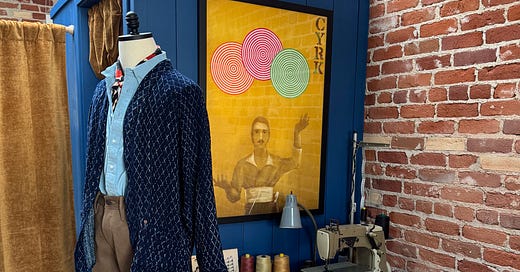



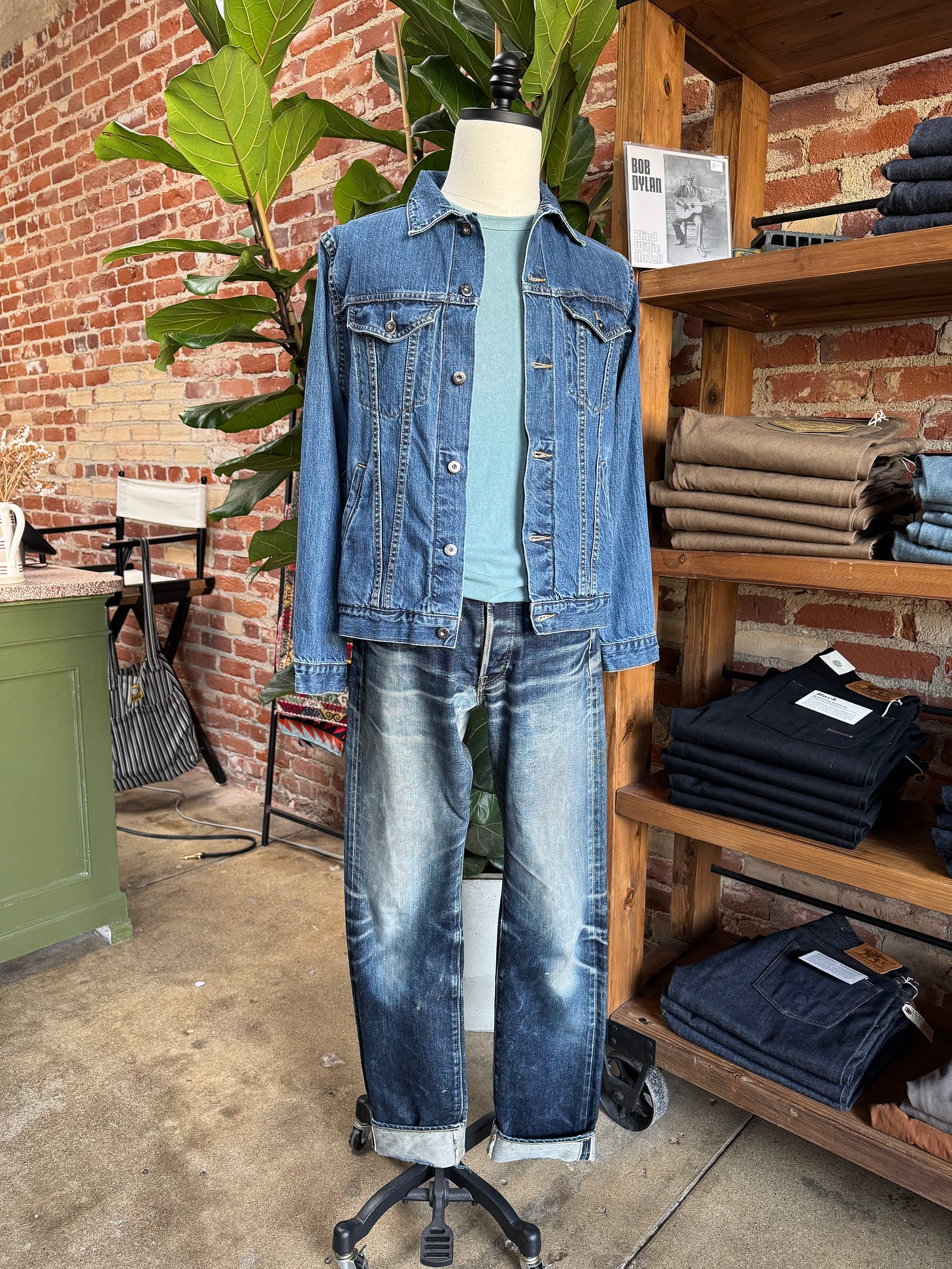

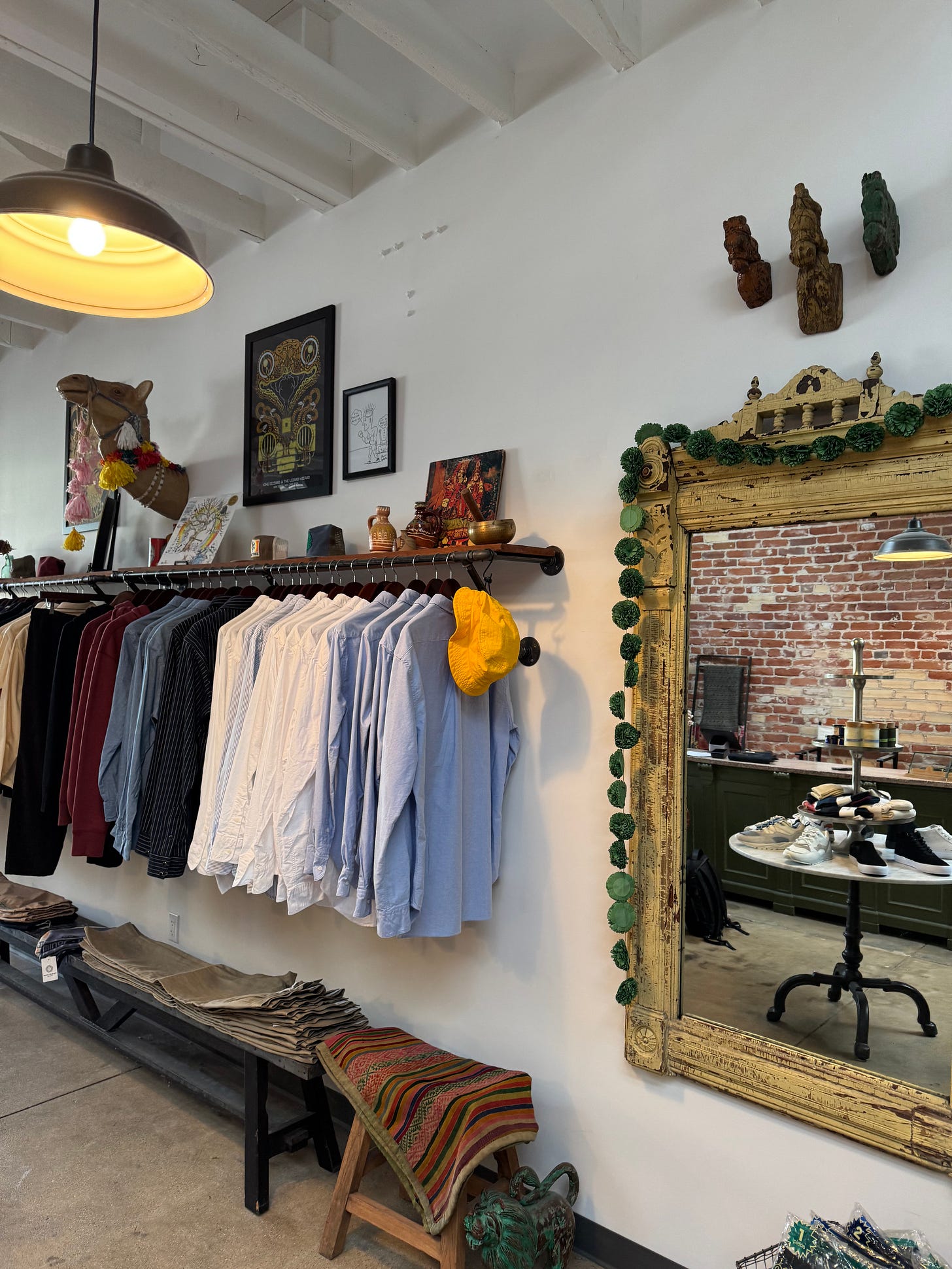
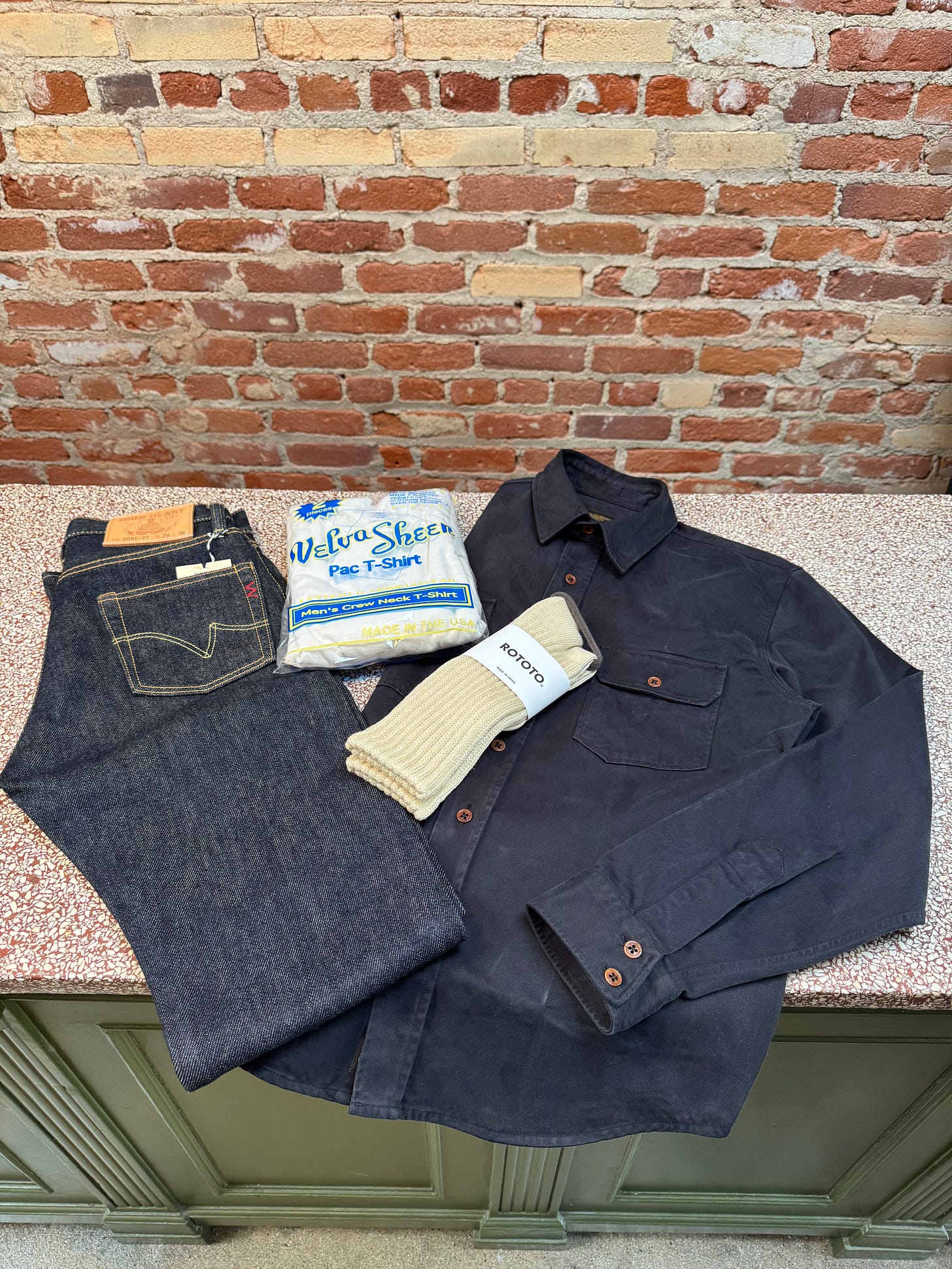
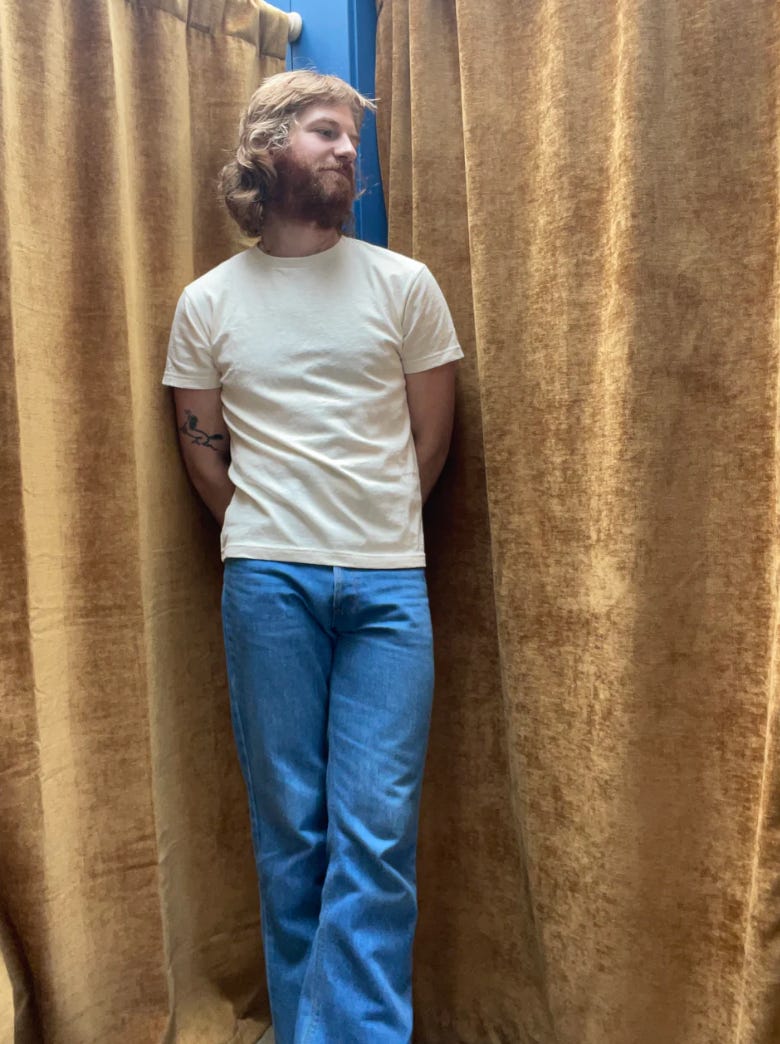

This is such a great interview!